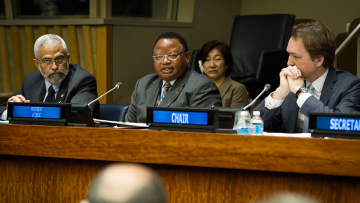Many speakers welcomed the relevance of the session’s theme, “Strategies for eradicating poverty to achieve sustainable development for all”, underscoring the Commission’s enormous potential to guide inclusive policies aimed at leaving no one behind.
“The adoption in 2015 of the 2030 Agenda for Sustainable Development was a historic step forward in our common approach to tackling the many challenges all societies and countries face,” said Commission Chair Philipp Charwath, who was elected by acclamation at the meeting’s outset.
While progress has been made in promoting the rights of vulnerable people — including persons with disabilities and the rapidly growing number of older persons around the globe — poverty remains a major threat. As part of its work, the Commission will help address such issues by supporting the thematic reviews of the High-Level Political Forum on Sustainable Development, Mr. Charwath said.
Peter Thomson, President of the General Assembly, said the Commission’s longstanding work to promote people-centred development has helped shape key sustainable development concepts and laid the foundation for the 2030 Agenda. The body will now help ensure that that “master plan for people, planet and prosperity” is?implemented, he said, expressing confidence that the achievement of its 17 Sustainable Development Goals is “firmly within our reach”.
 “Today’s generation can be the one that eradicates poverty and turns the tide on inequality, exclusion and environmental degradation,” agreed Frederick Musiiwa Makamure Shava, President of the Economic and Social Council.
“Today’s generation can be the one that eradicates poverty and turns the tide on inequality, exclusion and environmental degradation,” agreed Frederick Musiiwa Makamure Shava, President of the Economic and Social Council.Noting that it was increasingly difficult to reach people living in extreme poverty and that progress was often temporary, he emphasized that achieving the 2030 Agenda’s objectives would require a broad set of mutually reinforcing social and economic policies, as well as leveraging the synergies among them.
Delivering a statement on behalf of Secretary-General António Guterres, Lenni Montiel, UN DESA’s Assistant Secretary-General for Economic Development, said the Commission was meeting at a time of global contradictions.
While significant progress has been made in eradicating extreme poverty, conflicts are reversing gains in social well-being and the gap between rich and poor is growing. Achieving the Sustainable Development Goals will require whole-of-society approaches tailored to national contexts, he stressed, adding that diversity must be viewed as an asset rather than a threat.
As the Commission began its general debate, many Government ministers and other high-level officials expressed optimism that the Commission’s unflagging support of inclusive, rights-based development strategies will dovetail with the 2030 Agenda’s implementation and continued reductions in poverty.
Source: Meetings coverage by the UN Department of Public Information

